
Entrepreneurship, Tobacco Bring Science, Money to NC Industrial Hemp Farming
![]()
North Carolina farmers are accustomed to dealing with weather problems, diseases in crops and animals, weed infestations and price swings.
Maybe that’s why an increasing number are willing to take on a few more challenges to grow what has become a promising new cash crop – hemp.
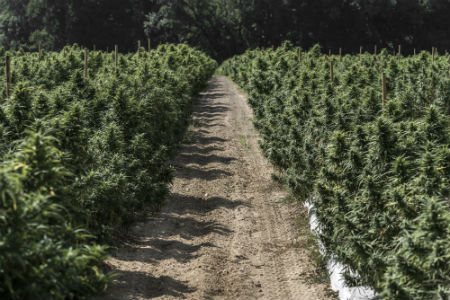
Hemp is a form of cannabis. But unlike its more familiar sibling marijuana, this industrial version is specially bred to produce high levels of a valuable extract called cannabidiol (CBD) oil without producing the “high” of marijuana’s active ingredient, delta-9 tetrahydrocannabinol (THC).
High-grade industrial hemp, standing about six feet tall and five feet across at maturity, looks just like marijuana. It even contains trace amounts of THC. But the industrial hemp has a CBD-to-THC ratio of about 35-to-1. Recreational marijuana, on the other hand, reverses that ratio.
CBD oil is becoming popular as a health supplement, touted to help people with a wide range of problems, from anxiety and insomnia to inflammation and seizures.
The challenges for those embarking on hemp are understandably unique. The planting and harvesting are somewhat akin to tobacco, making it a “natural” for North Carolinians. But it’s not enough to simply grow the crop and harvest it. Someone needs to be available to buy it reliably from growers, and long-term success in the marketplace will require high-tech extraction of the CBD and scientific analysis to certify the end product’s quality and potency.
Enter Criticality, a budding hemp processing company in the small northeastern North Carolina farming town of Hobgood, in Halifax County.
Criticality is converting a 90,000-square-foot tobacco-buying facility about 35 miles southwest, in Wilson, to bring the techniques of Good Manufacturing Practice (GMP) to North Carolina’s newly expanding CBD industry. It brings a food-grade quality approach to manufacturing, enabling Criticality to minimize or eliminate instances of contamination, mix-ups, and errors.
Scott Propheter, head of field operations and outreach for Criticality, said the new company has already initiated extraction, formulation and marketing of CBD products in the state (see the story on its product launch here). But its large-scale operations will begin in early 2019. Numerous other companies have been formed around the state to produce CBD, he noted, but “some of them are operating out of their garages, with inconsistent results.”
“Unfortunately there’s lots of mis-labeling out there,” he said of the unregulated CBD marketplace. “In some cases, the dosages are not as labeled. Some unscrupulous companies are even selling Spice or K2 or other synthetics rather than pure CBD.”
Synthetic marijuana-like compounds, commonly called K2 or Spice, are chemically different from marijuana, and often dangerous. They’re made by spraying various chemicals onto plants. They can produce seizures, psychosis and even death. In early July emergency workers in Brooklyn, N.Y. sent 33 people to hospitals when they were found stumbling through a neighborhood with zombie-like blank stares on their faces. A similar “outbreak” then happened in August in New Haven, Conn., resulting in more than 85 hospitalizations.
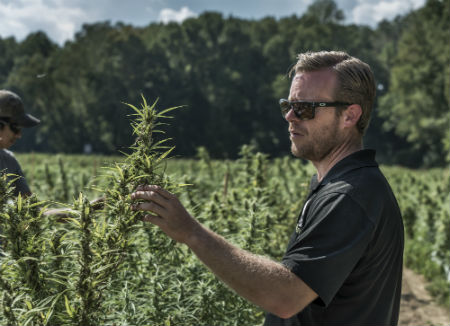
Criticality’s CBD will not only be produced from high-quality hemp with science-based extraction techniques, said Propheter, but the company’s CBD products will bear lot-number identification labels so consumers will be able to check online for our certified analyses to assure quality and consistency.
Meanwhile, he said, a provision in the 2018 federal farm bill will establish a process within the U.S. Food and Drug Administration to regulate CBD.
Criticality has partnered with Pyxus International, Inc. (formerly Alliance One International), a $2 billion Morrisville-based global agricultural company. In December 2017, a Pyxus subsidiary, Pure-Ag NC, LLC, acquired a 40 percent equity position in Criticality, with triggers that allow for consolidation up to 50 percent on or after March 31, 2020.
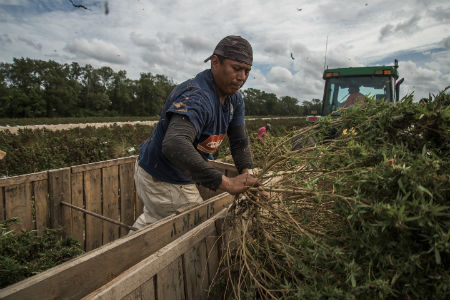
The deal gave Criticality access to Pyxus’ farmer network to grow industrial hemp in North Carolina under the state’s recently enacted pilot program legalizing industrial hemp production. Pyxus said its five-year goal is to become a leader in CBD production and consumer products.
On February 8, 2018, Pyxus disclosed plans to expand its business into e-liquids, industrial hemp and legal Canadian cannabis. The publicly traded company changed its name to Pyxus in August to reflect that change, while retaining the Alliance One brand name for its leaf tobacco business.

Criticality is one of ten registered industrial hemp processors in North Carolina, but the Pyxus deal marked the first significant move by the tobacco industry to enter the U.S. hemp industry. The joint venture was formed to procure industrial hemp under the North Carolina Industrial Hemp Commission’s pilot program and to extract CBD for sale to consumers. In general, hemp is classified as a controlled substance under federal law. But the federal Agricultural Act of 2014 farm bill exempted it when cultivated and processed as part of a state-supervised agricultural pilot program.
North Carolina’s Industrial Hemp Commission set up an approved pilot program, with strong leadership and support from North Carolina State University. The NC State extension office has launched a website listing upcoming events, news and information to help farmers and processors in the state.
Propheter said the state’s hemp commission permitted 1,300 acres in 2017, the first year of production. This year, farmers planted more than 4,300 acres. Even though it’s “an extremely resilient crop,” he said, there are no labeled pesticides, fungicides or herbicides that can be used by growers. “But North Carolina farmers will find a way – and quick – if the crop runs into trouble. Right now this crop costs about $4 to $5 a plant. And at 1,200 to 1,400 plants per acre, this is a significant investment for North Carolina farmers.. NCSU continues to be a fantastic resource, putting on field days and helping growers.” He said Criticality hopes to eventually bring the cost of their industrial hemp plants down to about 10 cents apiece.
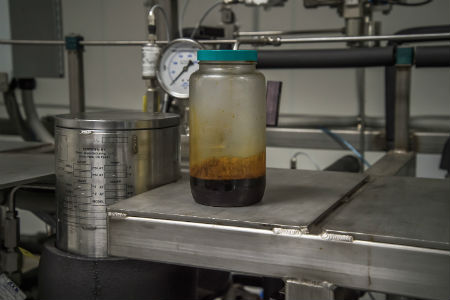
Pyxus says its transformation plan, called "One Tomorrow," is intended to “drive future growth opportunities and reshape its brand as the trusted provider of responsibly produced, independently verified, sustainable, and traceable agricultural products, ingredients and services.”
Pyxus’ equity deal with Criticality is part of its "One Tomorrow" long-term business strategy, in which the company is actively pursuing new business lines focused on agricultural products that are value-added or require some degree of processing, with higher margin and growth potential than its leaf tobacco business and that play well to its strengths. Besides e-liquids and industrial hemp, the company is also delving into legal cannabis in Canada.
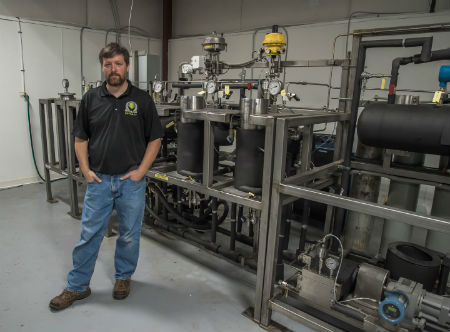
fine-tunes the equipment to prepare for production.
"Inspired by the Greek word for compass, the new name, Pyxus, expresses our commitment to exploring new directions for the benefit of our people, our products and the planet,” said Pieter Sikkel, president, CEO and Chairman of Pyxus, said in a news release. “We are a 145-year-old agricultural company that keeps the farmer at the heart of everything we do, and we are pursuing a larger purpose-driven vision with the goal of transforming people's lives so that together we can grow a better world."
"Pyxus International, Inc. reflects the company's diverse global operations and our intention to continue broadening our business portfolio over the next three to four years by focusing on consumer-driven agricultural products. The Alliance One name will remain with the tobacco business to honor the legacy and history of the brand, which includes its strong reputation for sustainable farming, innovation and community partnership."
Criticality, meanwhile, is poised to bring new opportunities to North Carolina’s farmers while contributing to its profile as a global life science leader.
